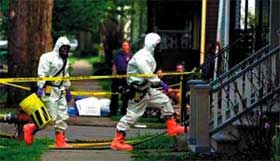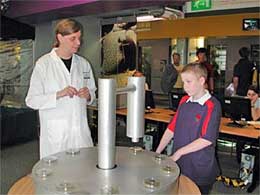 Who am i to think that i can live in the German capital and ignore the Berlinale? Yesterday i finally decided to face the queues to get tickets and grabbed the last chance to see Strange Culture, the half-documentary half fiction movie about Steve Kurtz's surreal -and ongoing- ordeal.
Who am i to think that i can live in the German capital and ignore the Berlinale? Yesterday i finally decided to face the queues to get tickets and grabbed the last chance to see Strange Culture, the half-documentary half fiction movie about Steve Kurtz's surreal -and ongoing- ordeal.
Kurtz, Associate Professor for Art at the University at Buffalo and one of the founding members of the Critical Art Ensemble, was preparing for a MASS MoCA exhibition a piece called Free Range Grains that lets audiences test whether food -including "organic" food- has been genetically modified when his wife Hope died of heart failure. It was the night of 11 May, 2004. Kurtz called 911, but when paramedics arrived, they became suspicious of his art supplies and called the FBI.
 Dozens of agents in hazmat suits swiftly arrived, found Petri dishes, bacterial cultures and scientific equipment, all of which Kurtz got legally (some of them he even bought on the internet) and uses in art installations that examine political, social and ethical factors involved in the field of biotechnology. The FBI confiscated his material, computers, books, and his wife's body. Even the cat, a "potential biohazard", was locked in the attic without food. The government held Kurtz as a suspected bioterrorist. A thorough inquiry showed that he wasn't possessing anything dangerous so what started as a full federal bio-terrorism investigation ended up as charges of wire and mail fraud (although no one appears to have been frauded!) He and his colleague, former head of the Genetic Department of Pittsburgh University Dr Robert Ferrell, face up to 20 years in prison.
Dozens of agents in hazmat suits swiftly arrived, found Petri dishes, bacterial cultures and scientific equipment, all of which Kurtz got legally (some of them he even bought on the internet) and uses in art installations that examine political, social and ethical factors involved in the field of biotechnology. The FBI confiscated his material, computers, books, and his wife's body. Even the cat, a "potential biohazard", was locked in the attic without food. The government held Kurtz as a suspected bioterrorist. A thorough inquiry showed that he wasn't possessing anything dangerous so what started as a full federal bio-terrorism investigation ended up as charges of wire and mail fraud (although no one appears to have been frauded!) He and his colleague, former head of the Genetic Department of Pittsburgh University Dr Robert Ferrell, face up to 20 years in prison.
Because Kurtz cannot legally talk about certains aspects of his case, actors Tilda Swinton, Josh Kornbluth, and Peter Coyote, are interpreting several episodes of Kurts' story. The reenactments are intertwined with news footage, comic book drawings, testimonials, and interviews of Kurtz himself.
Using the case of Kurtz, Strange Culture makes clear the risks to which critical artists in the USA are exposed in the name of national security. By using civil law to bring criminal charges, the Justice Department is trying to expand its powers over citizens. Besides, both the government and agribusiness have a huge investment in GMF, so anyone within the scientific and artistic community who is raising the debate on Frankenfood has to be silenced. As Steve Dietz said in an interview for the documentary: "If an artist is silenced, then the potential is for everyone to be silenced."
The movie was written and directed by artist and cultural analyst Lynn Hershman Leeson.
The best part of the screening came at the end of the film when the audience was able to talk with Kurtz. He also gave a little intro speech before the movie, saying that what happens to him looks crazy and horrible but it is nothing compared to what other people face when they are submitted to extraordinary rendition. Victims are chosen because of their vulnerability, they never pick on priviledge people who can defend themselves (and Steve, although very vulnerable after the death of his wife, believes that he's priviledged because he has the support of his colleagues and of the art community). For vulnerable people the nightmare can get so much worse so Kurtz hopes that the film can help raise our awareness to an unpleasant and not enough publicized reality.
Note on your agenda: Feb 18 - 25, CAE exhibition & performance of Marching Plague in Leipzig.
March 15, Screening of Strange Culture at the SF MoMA in San Francisco.
Read more about the case in the Critical Art Ensemble Defense Fund.


